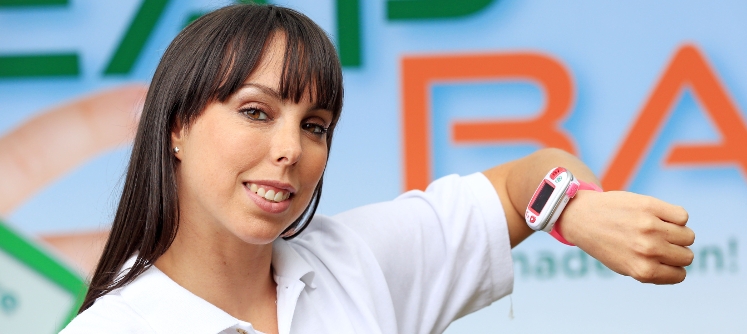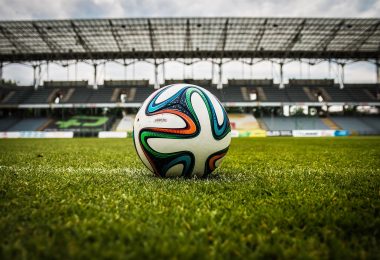No-one knows more about staying committed to sport than Beth Tweddle.
Starting out at the age of seven, Beth went on to become an Olympic Bronze Medalist, triple World Champion, six-time European Champion, Commonwealth Champion and seven-times consecutive National Champion, cementing her place as Britain’s greatest ever-female gymnast.
Although memories of Beth taking the Bronze in the Uneven Bars at London 2012 – the culmination of an incredible career – will not be forgotten anytime soon, sharing a fierce passion for gymnastics with future generations has become her new focus.
After receiving an MBE for her success, commitment and dedication to the sport in 2010, Beth set up Total Gymnastics to provide the opportunity for as many children as possible to take up gymnastics and develop the sport around the country. She is also an ambassador for the LeapBand – the wearable fitness tracker created by educational toy company LeapFrog – which offers 50 different activities and challenges children to encourage healthy play and habits.
Sam Skelding caught up with the gymnastics legend to talk about getting kids on the move, role models and her parents being there for every high and every low.
What are the biggest obstacles to getting kids active?
I feel there are a lot of different obstacles at the moment. Children will always need their parents’ support behind them and that’s not always possible. Sometimes it can just be a matter of cost and depending on the activity, there can be issues getting to the venue and having all of the right equipment to take part. It could also be other distractions stopping them from getting involved; they might not even be aware that there’s an opportunity to do something!
Perhaps an over-reliance on schools?
I don’t think everyone can be lumped into one group. There are so many parents out there who get really involved in their child’s physical activity, but it definitely helps having both the school and the parents on board.
So how can parents encourage their kids to exercise?
By making it fun for the child and getting involved themselves. If they feel involved and interested, I think they are more likely to encourage their children to keep going with it or try something new.
Do you think parents should become active role models?
I think it always helps to have a role model close to home. There are so many activities that can be done as a family now and they don’t really have to cost a lot of money.
How does the LeapBand fit into all this?
The LeapBand encourages children to be active. Most children these days know technology better than their parents, so incorporating this into part of their activity regime is really helpful. The more they play and the more points they earn, the more things are unlocked, so they are constantly getting that sense of achievement and won’t necessarily realise they are doing physical activity at the same time.
What’s more important for kids starting out in sport, fun or desire?
I think it has to be fun! Without the fun element they are less likely to continue.
Does this change once in the elite field?
I think you still have to enjoy it. You are spending so many hours in the gym training and performing that without love for the sport it would be a hard slog. Don’t get me wrong, of course the desire to achieve the goals is there but without the love and enjoying yourself, it can be a long road to success.
You were hugely successful, but how did you stay in love with gymnastics?
I didn’t ever struggle to love my sport! From the first competition I absolutely loved it and it never changed. I think I was lucky, I never had that sense of wanting to give up and even today I still love it.
What role did your parents play?
My parents were so important throughout my career. At first they were the financial and emotional support. Anything I needed came from them and I could ask anything from them. They were just there for every high and every low.
So they weren’t the cliché ‘pushy sports parents’?
Not at all! I don’t have any specific memories, but they were just always there for me. I never felt like I was ever forced through the doors of the gym, I always wanted to go to training. They trusted my coach and allowed her to manage my training programme.
Your parents have spoken about chatting in the car on the way to training or big tournaments, what did those moments mean to you?
At the time I don’t think I realised how good those moments actually were but looking back on it, it was great to be able to spend that time and chat with my parents. Most of the time it wasn’t necessarily about my competitions, it was just a typical parent-child everyday chat but looking back, I was able to spend a lot of quality time with my parents when travelling to and from the gym.
What difference did their support make to your performance?
I think it was just having the constant support around me that really helped. Knowing that if I had a bad day’s training, there was always a big hug waiting for me to cheer me up or if I had achieved a new move that I had been working on, my parents would always be just as excited as me when I told them I had finally done it for the first time.
Is there a blueprint for ensuring kids don’t get disillusioned with their sport?
All children have highs and lows and the encouragement and goals that they set have to be realistic. These goals should be set with the help of parents and coaches.
You set up Total Gymnastics with Steve Parry – what was behind that?
I always have and always will love my sport and I want every child to have a go at gymnastics. They might love it, they might hate it, but at least they’ve tried it. Without trying something you can’t make that decision and Total Gymnastics is there to give children the chance to try the sport that I love, and hopefully they will too! I have always wanted to give back and always will do.
Has gymnastics’ image changed in modern times?
I think it has. When people speak to me about gymnastics, everyone is always very complimentary about our sport and how well British Gymnastics are now doing on a world stage. We now have a number of household names which helps with our profile as a sport in this country and role models for the younger generation to look up and aspire to.
Is accessibility to sports facilities for kids still an issue in the UK?
There is always more that can be done but we are definitely heading in the right direction.
What’s next for Beth Tweddle?
That’s a very good question. I am working closely with Total Gymnastics and developing it so more children around the UK can be given the opportunity to try our amazing sport. I’m also looking forward to working with a lot more children around the country to inspire them to get out there and have a go at sport. It can be any sport, although obviously I would love it to be gymnastics!








